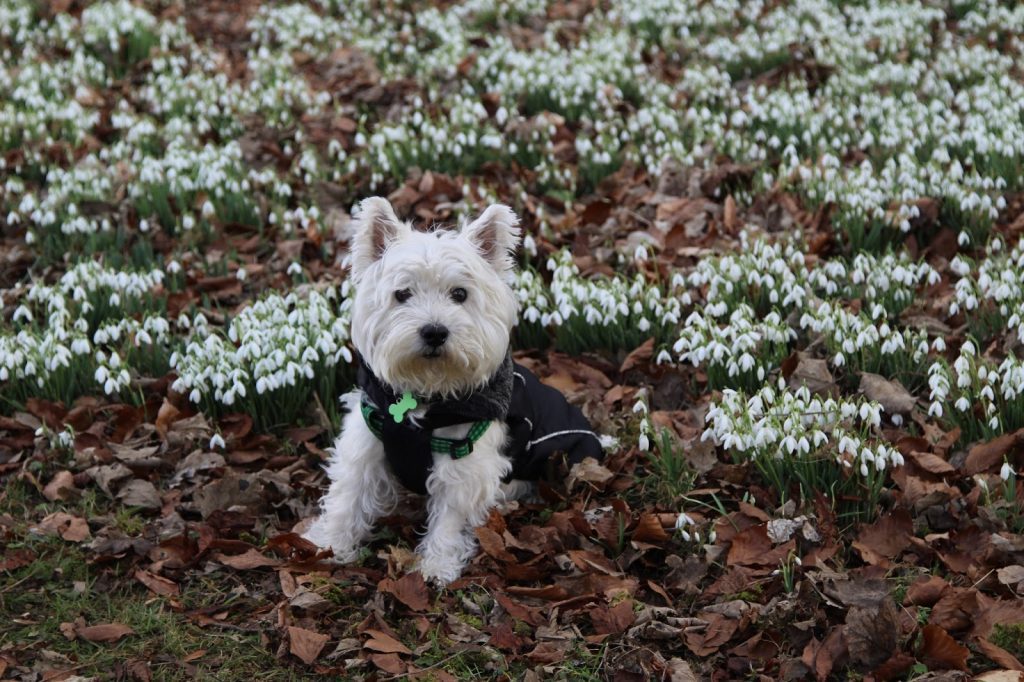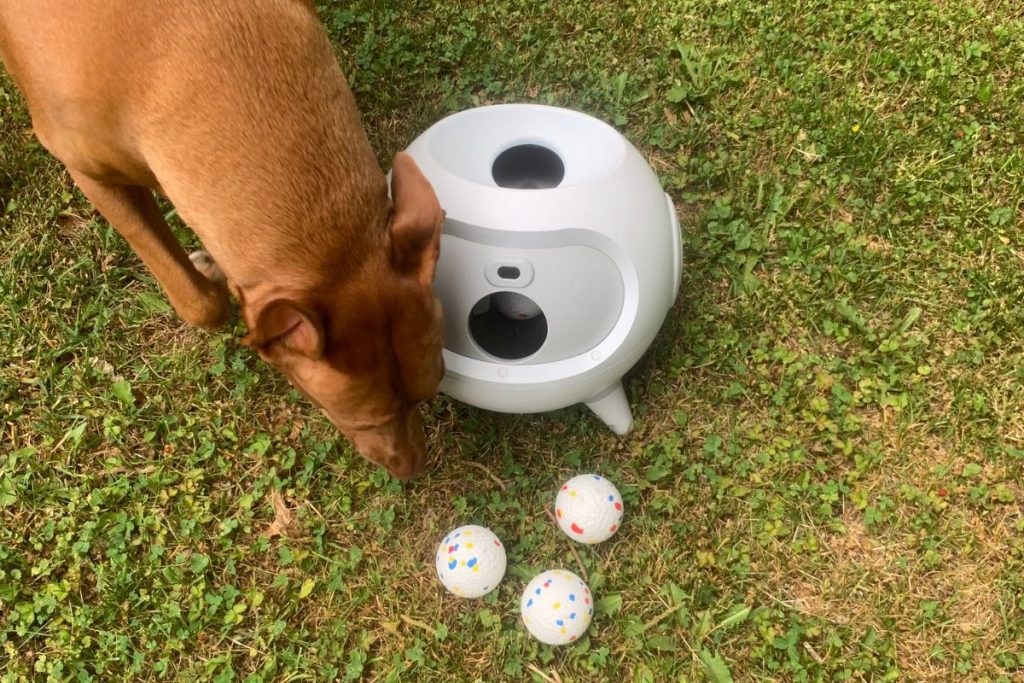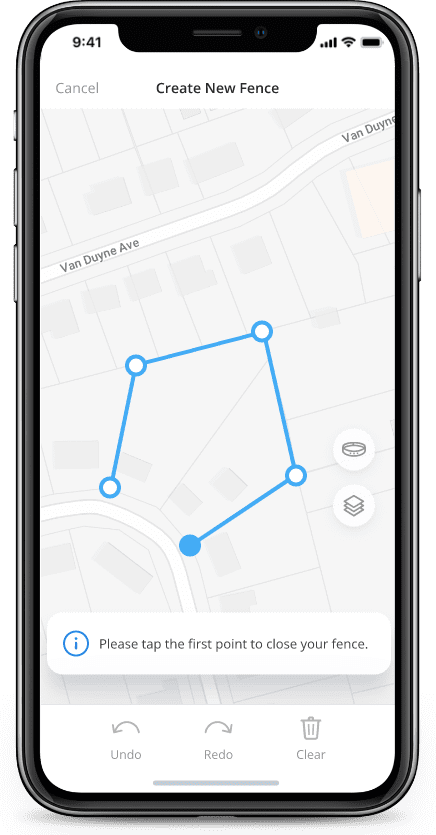If you have a dog who loves digging up your garden, you’re not alone. Many dog owners struggle with this behavior, but there are steps you can take to discourage your dog from tearing apart your garden and help them develop more appropriate behaviors. In this article, we’ll explore four expert tips that discuss how to stop your dog from digging! Keep reading!

Understanding Why Dogs Dig
Before we dive into the tips, it’s important to understand why dogs dig in the first place. Digging is a natural instinct for dogs, and they have a variety of reasons for engaging in this behavior.
The Natural Instinct of Dogs
Contrary to popular belief, dogs aren’t descended from wolves. They are, however, descended from the same ancestor as their wild canine counterparts, so they do share some of the same instincts, including digging.
Just like wolves would dig dens to create a safe and comfortable environment for their family, dogs may dig to create a cozy space for themselves.
When dogs dig, they are not only satisfying their instinctual need but also creating a space where they can feel secure and protected. This behavior is deeply rooted in their DNA and is a way for them to establish their territory.
Common Reasons for Excessive Digging
Boredom can be a significant factor in excessive digging, especially if your dog is not getting enough mental and physical stimulation. Lack of exercise and mental enrichment can lead to restlessness and a need for an outlet, which often manifests as digging.
Seeking attention is another reason why dogs may resort to digging. If they feel neglected or are not receiving enough interaction from their owners, they may engage in this behavior as a way to gain attention. It is their way of saying, “Hey, look at me! I need some love and attention!”
In some cases, dogs may dig to escape from their surroundings. This can happen if they are feeling anxious, scared, or confined. For example, if your dog is terrified of fireworks and you leave him outside while you’re away, he may feel like he has no choice but to dig his way to safety.
Dogs have an incredible sense of smell, and they may find certain scents or sounds intriguing, prompting them to dig in search of something interesting. They have a natural curiosity that drives them to explore their environment, and digging is one way they satisfy this curiosity.
Last, but not least, some dogs dig to bury things. Bones, toys, your favorite pair of shoes…pretty much anything that they want to save for later! Check out our post, “Why Do Dogs Bury Bones?” over on DogVills to learn more!
Identifying the underlying reason for your dog’s digging can help you address the issue more effectively. By understanding their motivations, you can tailor your approach to meet their specific needs and provide appropriate alternatives to satisfy their instinctual behaviors.
Tip 1: Provide Adequate Exercise for Your Dog
One of the most important steps in discouraging your dog from digging is ensuring they get enough exercise on a daily basis.
The Importance of Regular Exercise
Dogs that are not sufficiently exercised are more likely to exhibit destructive behaviors, such as digging. Regular physical activity helps to release excess energy, keeping your dog happy and content. Aim for at least 30 minutes to an hour of exercise each day, depending on your dog’s breed and age.
Best Exercise Activities for Dogs Who Dig
Take your dog for long walks, engage them in games of fetch, or consider enrolling them in obedience training or agility classes. Mental stimulation through training exercises can also provide an appropriate outlet for their energy. With regular exercise, your dog will be less inclined to dig up your garden.
The Benefits of Long Walks
Long walks not only provide physical exercise for your dog, but they also offer mental stimulation and the opportunity for your furry friend to explore their surroundings.
Dogs are naturally curious creatures, and taking them on long walks allows them to sniff, see new sights, and interact with their environment. This sensory experience can tire them out and reduce their desire to dig when they get back home.
PRO TIP: If you live in an area where it’s allowed (and your dog has enough off-leash training to do so) let Fido loose to explore on his own (with you close behind him, of course). Add an extra level of security with a good dog GPS collar.

The Joy of Fetch
Playing fetch is an excellent way to engage your dog in a fun and interactive activity. It helps them burn off energy while also strengthening their muscles and improving their coordination.
By throwing a ball or a toy for your dog to retrieve, you are providing them with a purposeful task that channels their energy in a positive way. This can be especially beneficial for high-energy breeds that are prone to digging.
PRO TIP: If you don’t want to (or are unable to) keep throwing the ball, check out our picks for the best automatic ball launchers! I’m really loving the Uahpet iRetriever right now!

The Power of Training
Enrolling your dog in obedience training or agility classes provides them with not only physical exercise but also mental stimulation. These structured activities teach your dog new commands and tricks, challenging their intelligence and problem-solving skills.
As they become more mentally engaged, they are less likely to resort to destructive behaviors like digging. Training also strengthens the bond between you and your dog, enhancing their overall well-being.
PRO TIP: Combine training with an invisible dog fence to keep your pup out of your garden entirely. You can create “go/no go” boundaries using something like the Halo 2 dog collar.

Exploring the World of Mental Stimulation
Training exercises, such as teaching your dog to sit, stay, or perform tricks, can be mentally stimulating for them. Dogs are intelligent creatures that thrive on mental challenges. By incorporating regular training sessions into their routine, you are giving them an outlet to focus their energy and satisfy their natural curiosity.
Mental stimulation can tire them out just as much as physical exercise, reducing their inclination to dig up your garden.
By providing your dog with a combination of physical exercise and mental stimulation, you are addressing their needs holistically.
This comprehensive approach to their well-being will not only discourage them from digging but also contribute to their overall happiness and fulfillment.
PRO TIP: Invest in some really good interactive dog toys that engage Fido’s mind and body.
Tip 2: Create a Dog-Friendly Garden
Creating a dog-friendly garden is not only a great way to prevent your furry friend from digging up your precious plants, but it also provides them with a safe and enjoyable outdoor space to explore. By following a few simple strategies, you can transform your garden into a haven for both you and your dog.
Choosing Dog-Friendly Plants
When it comes to selecting plants for your dog-friendly garden, it’s crucial to prioritize their safety. Some plants can be toxic to dogs, causing a range of health issues if ingested. To avoid any potential hazards, take the time to research and choose plants that are known to be safe for dogs.
Additionally, consider opting for more durable and hardy plant varieties. Dogs can be quite playful and energetic, so selecting plants that can withstand a bit of roughhousing will ensure your garden remains intact. Look for plants that can handle occasional trampling or brushing against them without getting damaged.

Providing Designated Digging Areas
Redirecting your dog’s digging instincts to a more appropriate location can be a game-changer in preserving the beauty of your garden. Consider creating designated digging areas, such as a sandbox or a specific section of your garden, where your dog can freely indulge in their digging desires.
Fill these areas with loose soil or sand, making it inviting and enjoyable for your dog to dig. You can even bury some of their favorite toys or treats to further entice them. By providing an alternative spot for them to satisfy their digging needs, you’ll be able to protect the rest of your garden from their enthusiastic paws.
Establishing Boundaries in the Garden
While creating a designated digging area is beneficial, it’s equally important to establish clear boundaries in your garden to prevent your dog from accessing areas that you’d like to keep intact.
One effective way to do this is by using fencing or other obstacles to restrict your dog’s access. This can be particularly useful if you have specific flower beds or delicate plants that you want to protect. Installing a low fence around these areas will act as a physical barrier, preventing your dog from getting too close.
Alternatively, you can use rocks, decorative borders, or plant barriers to discourage your dog from venturing into the parts of the garden where they are prone to dig. These visual cues can help signal to your dog that those areas are off-limits and should be respected.
By combining these strategies and creating a dog-friendly garden, you’ll not only save your plants from being uprooted but also provide your furry friend with a delightful outdoor space to explore and enjoy. Remember, a happy dog makes for a happy garden!
Tip 3: Use Deterrents to Discourage Digging
If your dog continues to dig despite your efforts, using deterrents can be an effective tool to discourage this behavior.
Natural Deterrents for Dogs
Many dogs dislike the smell and taste of certain substances. Sprinkle red pepper flakes, citrus peels, or vinegar around the areas where your dog tends to dig. The strong scents will deter them from digging in those spots.
Commercially Available Deterrents
There are also commercially available products designed to deter dogs from digging. These products often contain natural ingredients that are safe for your garden and pets. Follow the instructions carefully when using these deterrents to ensure effectiveness and safety.
Tip 4: Provide Mental Stimulation for Your Dog
In addition to physical exercise, mental stimulation is crucial for keeping your dog mentally engaged and content.
The Role of Toys and Puzzles
Invest in puzzle toys and interactive games that require your dog to use their brain and problem-solving skills. These activities will not only keep them occupied but also provide mental stimulation and help prevent boredom, which can lead to digging.
Training Your Dog to Stay Mentally Engaged
Regular training sessions can also keep your dog mentally stimulated. Teach them new tricks or commands, and engage in obedience training exercises. This mental engagement will help redirect their energy away from destructive behaviors like digging.
Conclusion
Incorporating these four tips into your dog’s routine can significantly reduce their urge to dig up your garden. Remember to provide adequate exercise, create a dog-friendly garden, use deterrents when necessary, and provide mental stimulation. With consistency and patience, you can discourage your dog from digging and enjoy a beautiful garden together.

